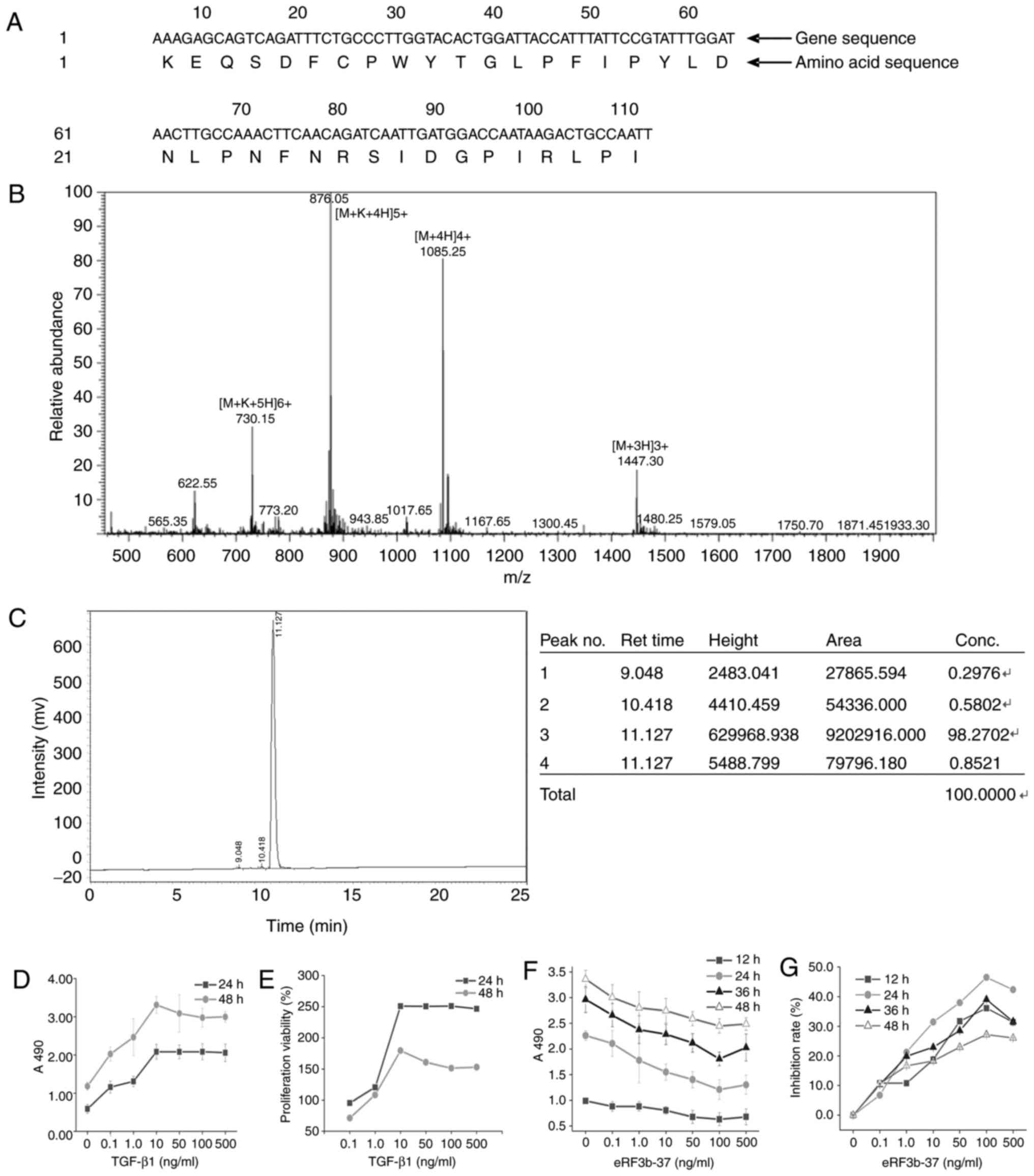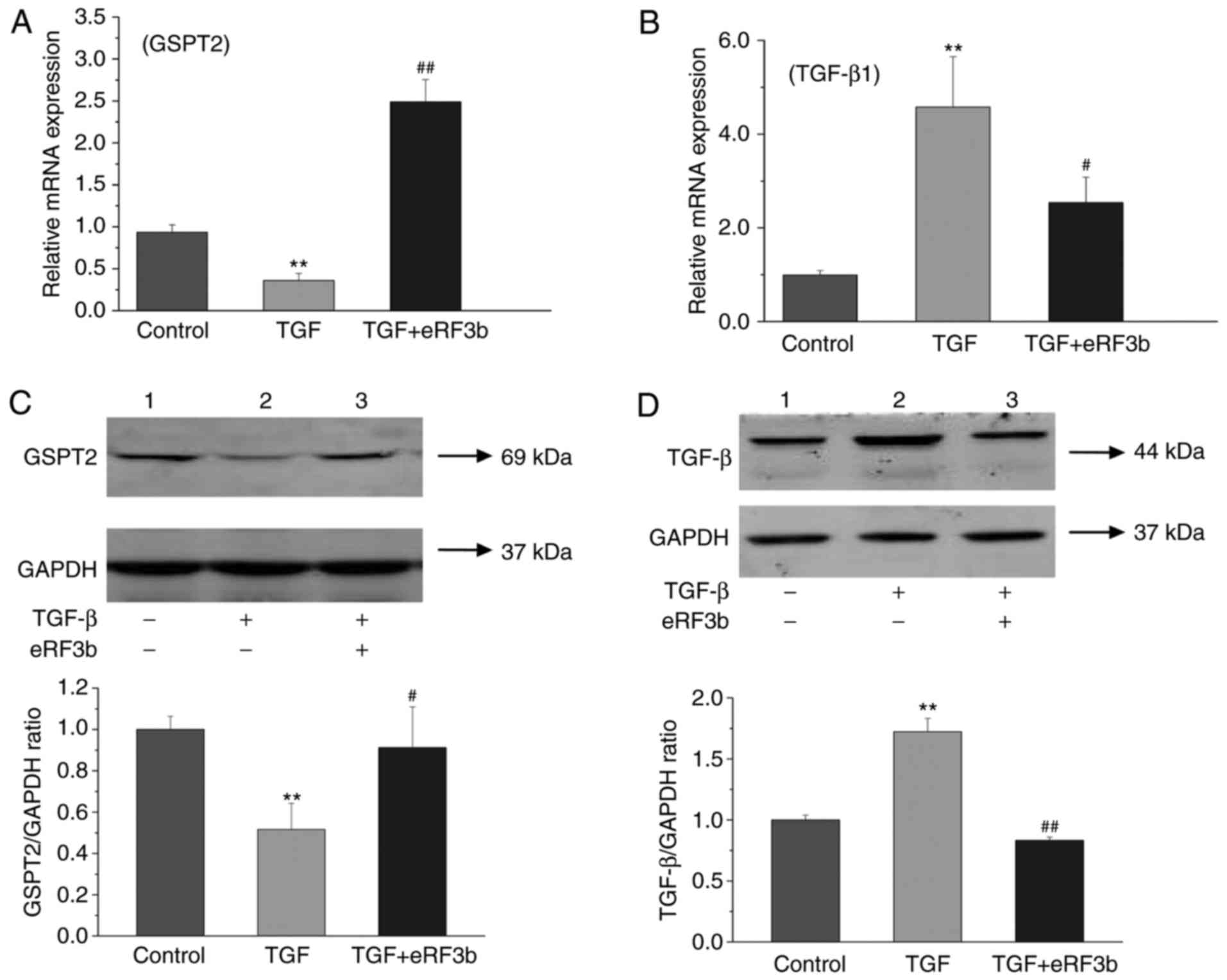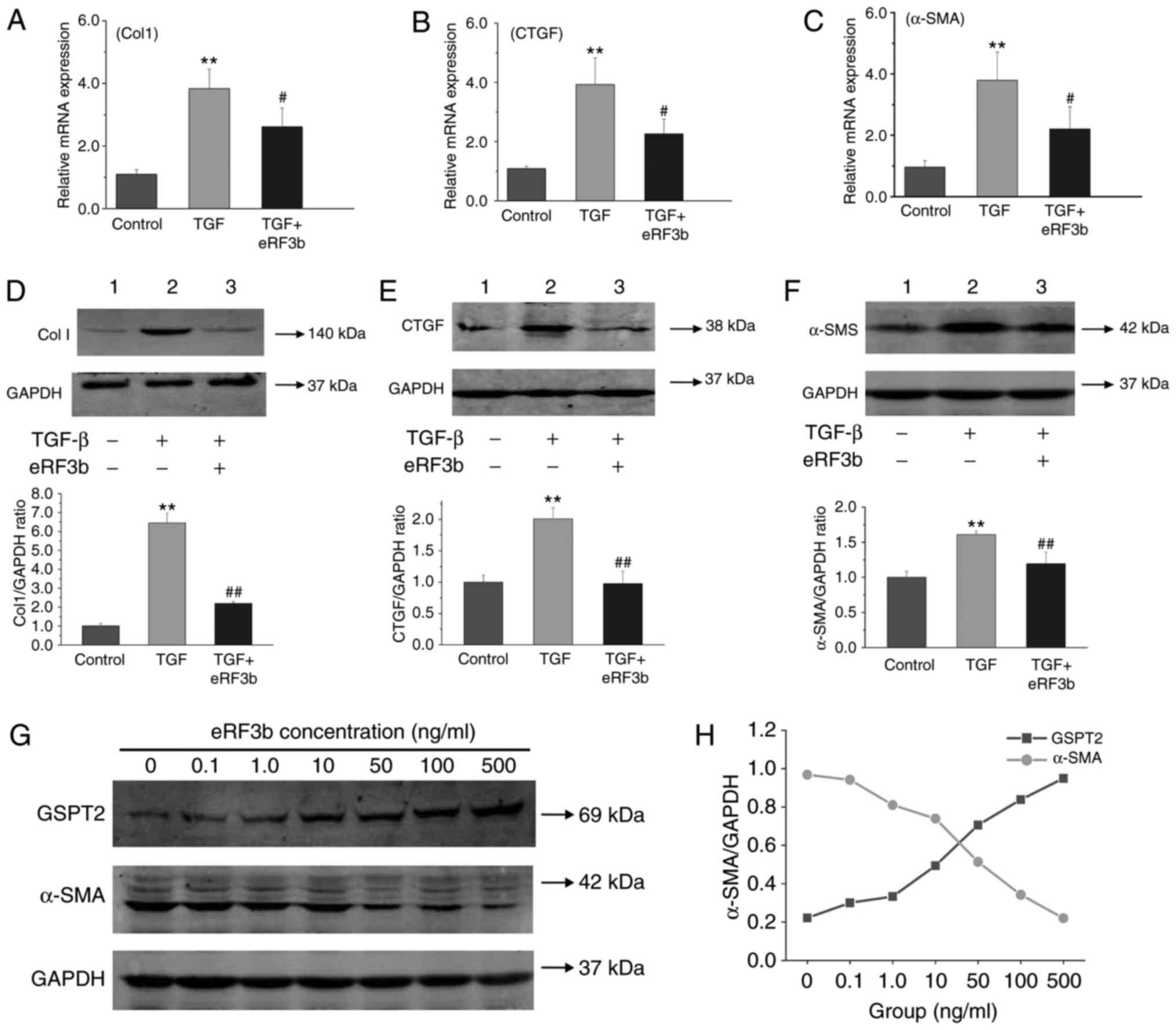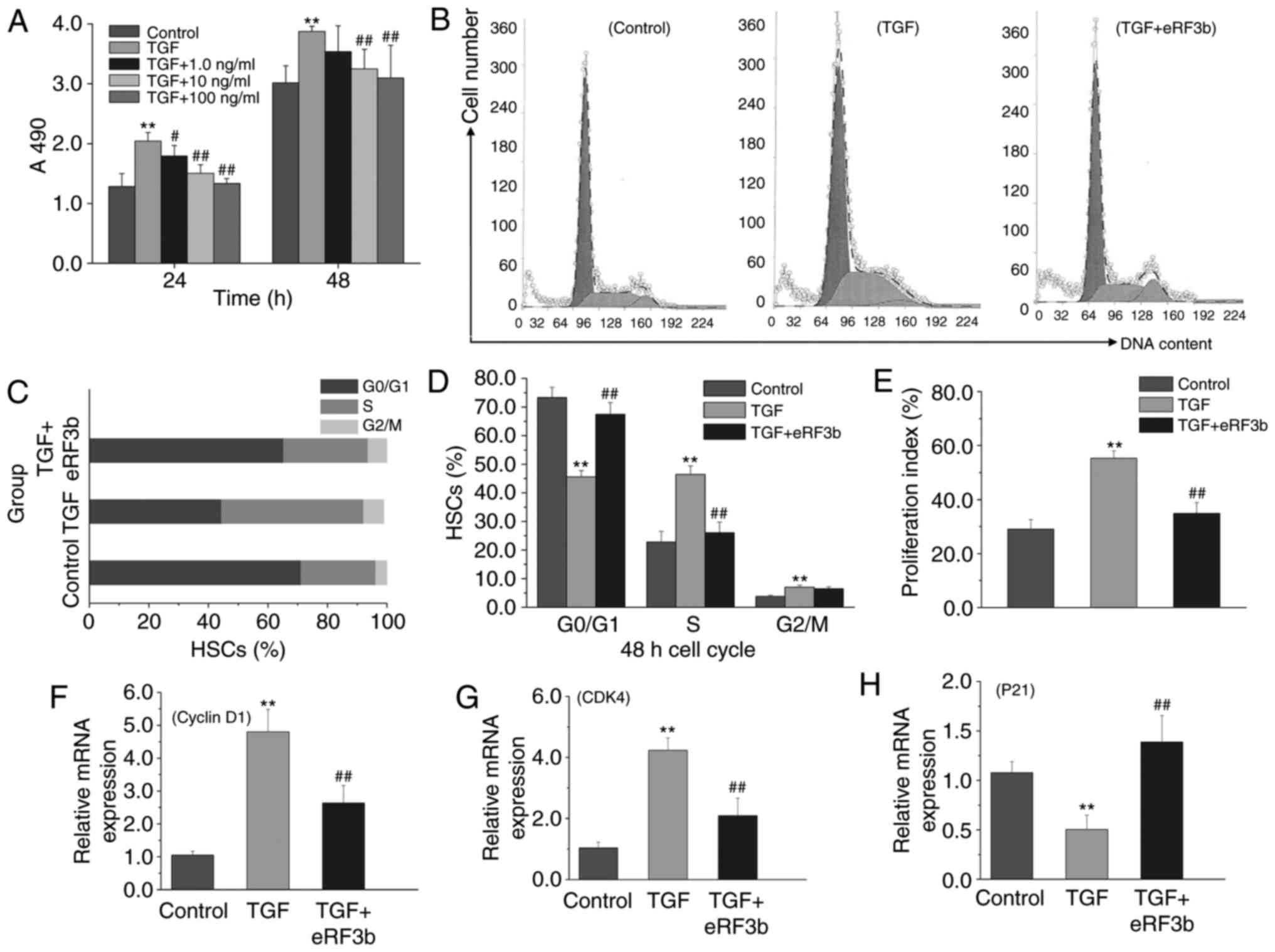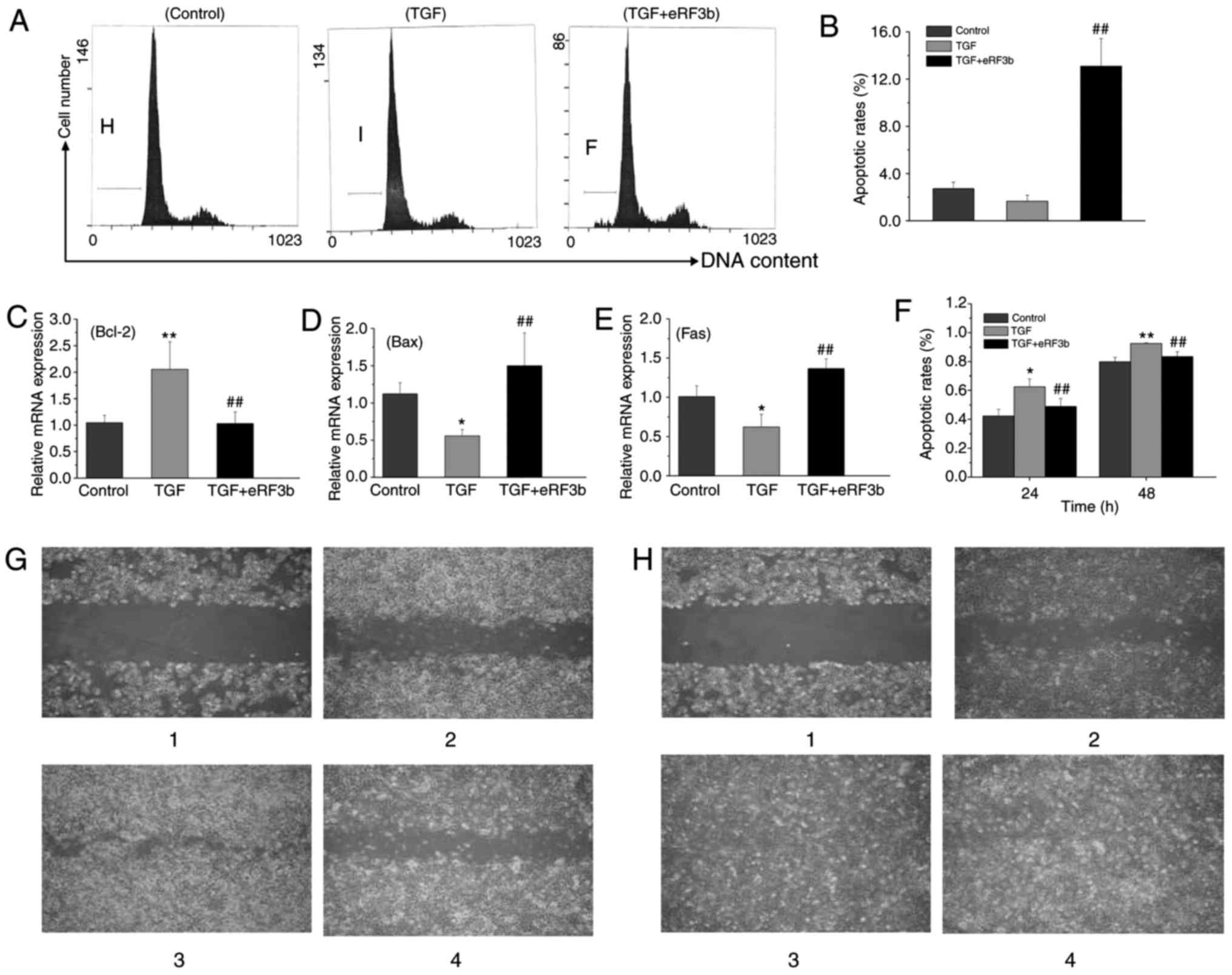|
1
|
Tang LX, He RH, Yang G, Tan JJ, Zhou L,
Meng XM, Huang XR and Lan HY: Asiatic acid inhibits liver fibrosis
by blocking TGF-beta/Smad signaling in vivo and in vitro. PLoS One.
7:e313502012. View Article : Google Scholar : PubMed/NCBI
|
|
2
|
Gressner AM, Yagmur E, Lahme B, Gressner O
and Stanzel S: Connective tissue growth factor in serum as a new
candidate test for assessment of hepatic fibrosis. Clin Chem.
52:1815–1817. 2006. View Article : Google Scholar : PubMed/NCBI
|
|
3
|
Tsukada S, Parsons CJ and Rippe RA:
Mechanisms of liver fibrosis. Clin Chim Acta. 364:33–60. 2006.
View Article : Google Scholar
|
|
4
|
Zhang CY, Yuan WG, He P, Lei JH and Wang
CX: Liver fibrosis and hepatic stellate cells: Etiology,
pathological hallmarks and therapeutic targets. World J
Gastroenterol. 22:10512–10522. 2016. View Article : Google Scholar
|
|
5
|
Peelman F, Waelput W, Iaerentant H, Lavens
D, Eyckerman S, Zabeau L and Tavenier J: Leptin: Linking adipocyte
metabolism with cardiovascular and autoimmune diseases. Prog Lipid
Res. 43:283–301. 2004. View Article : Google Scholar : PubMed/NCBI
|
|
6
|
Li L, Wang JY, Yang CQ and Jiang W: Effect
of RhoA on transforming growth factor β1-induced rat hepatic
stellate cell migration. Liver Int. 32:1093–1102. 2012. View Article : Google Scholar : PubMed/NCBI
|
|
7
|
Bataller R and Brenner DA: Hepatic
satellite cells as a target for the treatment of liver fibrosis.
Semin Liver Dis. 21:437–451. 2001. View Article : Google Scholar : PubMed/NCBI
|
|
8
|
Chung YJ, Lee JI, Chong S, Seok JW, Park
SJ, Jang HW, Kim SW and Chung JH: Anti-proliferative effect and
action mechanism of dexamethasone in human medullary thyroid cancer
cell line. Endocr Res. 36:149–157. 2011. View Article : Google Scholar : PubMed/NCBI
|
|
9
|
Qi W, Chen X, Poronnik P and Pollock CA:
Transforming growth factor- beta/connective tissue growth factor
axis in the kidney. Int J Biochem Cell Biol. 40:9–13. 2008.
View Article : Google Scholar
|
|
10
|
Marquez-Aguirre A, Sandoval-Rodriguez A,
Gonzalez-Cuevas J, Bueno-Topete M, Navarro-Partida J,
Arellano-Olivera I, Lucano-Landeros S and Armendariz-Borunda J:
Adenoviral delivery of dominant-negative transforming growth factor
beta type II receptor upregulates transcriptional repressor
SKI-like oncogene, decreases matrix metalloproteinase 2 in hepatic
stellate cell and prevents liver fibrosis in rats. J Gene Med.
11:207–219. 2009. View Article : Google Scholar : PubMed/NCBI
|
|
11
|
George J, Roulot D, Koteliansky VE and
Bissell DM: In vivo inhibition of rat stellate cell activation by
soluble transforming growth factor beta type II receptor: A
potential new therapy for hepatic fibrosis. Proc Natl Acad Sci USA.
96:12719–12724. 1999. View Article : Google Scholar : PubMed/NCBI
|
|
12
|
Li M, Wang J, Dai E and Liu D:
Identification and investigation of disease-related peptides in
sera from patients with chronic hepatitis B. Wei Sheng Yan Jiu.
40:315–319. 2011.In Chinese. PubMed/NCBI
|
|
13
|
Livak KJ and Schmittgen TD: Analysis of
relative gene expression data using real-time quantitative PCR and
the 2(-Delta Delta C(T)) method. Methods. 25:402–408. 2001.
View Article : Google Scholar
|
|
14
|
Swanton C: Cell-cycle targeted therapies.
Lancet Oncol. 5:27–36. 2004. View Article : Google Scholar : PubMed/NCBI
|
|
15
|
Saile B, Matthes N, Knittel T and Ramadori
G: Transforming growth factor beta and tumor necrosis factor alpha
inhibit both apoptosis and proliferation of activated rat hepatic
stellate cells. Hepatology. 30:196–202. 1999. View Article : Google Scholar : PubMed/NCBI
|
|
16
|
Saile B, Matthes N, EI Armouche H,
Neubauer K and Ramadori G: The bcl, NFkappaB and p53/p21WAF1
systems are involved in spontaneous apoptosis and in the
anti-apoptotic effect of TGF-beta or TNF-alpha on activated hepatic
stellate cells. Eur J Cell Biol. 80:554–561. 2001. View Article : Google Scholar : PubMed/NCBI
|
|
17
|
Breitkopf K, Godoy P, Ciuclan L, Singer MV
and Dooley S: TGF-beta/Smad signaling in the injured liver. Z
Gastroenterol. 44:57–66. 2006. View Article : Google Scholar : PubMed/NCBI
|
|
18
|
Gao R, Ball DK, Perbal B and Brigstock DR:
Connective tissue growth factor (CCN2) induces c-fos gene
activation and cell proliferation through p42/44 MAP kinase
(ERK1/2) in primary rat hepatic stellate cells. J Hepatol.
40:431–438. 2004. View Article : Google Scholar : PubMed/NCBI
|
|
19
|
Deng ZY, Li J, Jin Y, Chen XL and Lü XW:
Effect of oxymatrine on the p38 mitogen-activated protein kinases
signalling pathway in rats with CCl4 induced hepatic fibrosis.
Chinese Med J (Engl). 122:1449–1454. 2009.
|
|
20
|
Kocabayoglu P and Friedman SL: Cellular
basis of hepatic fibrosis and its role in inflammation and cancer.
Front Biosci (Schol Ed). 5:217–230. 2013. View Article : Google Scholar
|
|
21
|
Shimada H, Staten NR and Rajagopalan LE:
TGF-β1 mediated activation of Rho kinase induces TGF-β2 and
endothelin-1 expression in human hepatic stellate cells. J Hepatol.
54:521–528. 2011. View Article : Google Scholar
|
|
22
|
Higashi T, Friedman SL and Hoshida Y:
Hepatic stellate cells as key target in liver fibrosis. Adv Drug
Deliv Rev. 121:27–42. 2017. View Article : Google Scholar : PubMed/NCBI
|
|
23
|
Qi W, Twigg S, Chen X, Polhill TS,
Poronnik P, Gilbert RE and Pollock CA: Integrated actions of
transforming growth factor-beta1 and connective tissue growth
factor in renal fibrosis. Am J Physiol Renal Physiol.
288:F800–F809. 2005. View Article : Google Scholar
|
|
24
|
Yokoi H, Sugawara A, Mukoyama M, Mori K,
Makino H, Suganami T, Nagae T, Yahata K, Fujinaga Y, Tanaka I and
Nakao K: Role of connective tissue growth factor in profibrotic
action of transforming growth factor-beta: A potential target for
preventing renal fibrosis. Am J Kidney Dis. 38(4 Suppl 1):
S134–S138. 2001. View Article : Google Scholar : PubMed/NCBI
|
|
25
|
Cao YL, Duan Y, Zhu LX, Zhan YN, Min SX
and Jin AM: TGF-β1, in association with the increased expression of
connective tissue growth factor, induce the hypertrophy of the
ligamentum flavum through the p38 MAPK pathway. Int J Mol Med.
38:391–398. 2016. View Article : Google Scholar : PubMed/NCBI
|
|
26
|
Williams EJ, Gaça MD, Brigstock DR, Arthur
MJ and Benyon RC: Increased expression of connective tissue growth
factor in fibrotic human liver and in activated hepatic stellate
cells. J Hepatol. 32:754–761. 2000. View Article : Google Scholar : PubMed/NCBI
|
|
27
|
Hopkins M, Tyson JJ and Novák B:
Cell-cycle transitions: A common role for stoichiometric
inhibitors. Mol Biol Cell. 28:3437–3446. 2017. View Article : Google Scholar : PubMed/NCBI
|
|
28
|
Jung KH, Kim JK, Noh JH, Eun JW, Bae HJ,
Xie HJ, Ahn YM, Park WS, Lee JY and Nam SW: Targeted disruption of
Nemo-like kinase inhibits tumor cell growth by simultaneous
suppression of cyclin D1 and CDK2 in human hepatocellular
carcinoma. J Cell Biochem. 110:686–696. 2010. View Article : Google Scholar
|
|
29
|
Meng L, Feng B, Tao H, Yang T, Meng Y, Zhu
W and Huang C: A novel antiestrogen agent (3R,6R)-bassiatin
inhibits cell proliferation and cell cycle progression by
repressing Cyclin D1 expression in 17β-estradiol-treated MCF-7
cells. Cell Biol Int. 35:599–605. 2011. View Article : Google Scholar : PubMed/NCBI
|
|
30
|
Lange C, Huttner WB and Calegari F:
Cdk4/CyclinD1 overex-pression in neural stem cells shortens G1,
delays neurogenesis, and promotes the generation and expansion of
basal progenitors. Cell Stem Cell. 5:320–331. 2009. View Article : Google Scholar : PubMed/NCBI
|
|
31
|
Qin LF and Ng IO: Exogenous expression of
p21 (WAF1/CIP1) exerts cell growth inhibition and enhances
sensitivity to cisplatin in hepatoma cells. Cancer Lett. 172:7–15.
2001. View Article : Google Scholar : PubMed/NCBI
|
|
32
|
Cazzalini O, Perucca P, Riva F, Stivala
LA, Bianchi L, Vannini V, Ducommun B and Prosperi E: p21CDKN1A does
not interfere with loading of PCNA at DNA replication sites, but
inhibits subsequent binding of DNA polymerase delta at the G1/S
phase transition. Cell Cycle. 2:596–603. 2003. View Article : Google Scholar : PubMed/NCBI
|
|
33
|
Green DR: Apoptotic pathways: Paper wraps
stone blunts scissors. Cell. 102:1–4. 2000. View Article : Google Scholar : PubMed/NCBI
|
|
34
|
Peng X, Yu Z, Liang N, Chi X, Li X, Jiang
M, Fang J, Cui H, Lai W, Zhou Y and Zhou S: The mitochondrial and
death receptor pathways involved in the thymocytes apoptosis
induced by aflatoxin B1. Oncotarget. 7:12222–12234. 2016.PubMed/NCBI
|
|
35
|
Kawada N: Human hepatic stellate cells are
resistant to apop-tosis: Implications for human fibrogenic liver
disease. Gut. 55:1073–1074. 2006. View Article : Google Scholar : PubMed/NCBI
|
|
36
|
Novo E, Marra F, Zamara E, Valfrè di Bonzo
L, Monitillo L, Cannito S, Petrai I, Mazzocca A, Bonacchi A, De
Franco RS, et al: Overexpression of Bcl-2 by activated human
hepatic stellate cells: Resistance to apoptosis as a mechanism of
progressive hepatic fibrogenesis in humans. Gut. 55:1174–1182.
2006. View Article : Google Scholar : PubMed/NCBI
|
|
37
|
Saile B, Knittel T, Matthes N, Schott P
and Ramadori G: CD95/CD95L-mediated apoptosis of the hepatic
stellate cell. A mechanism terminating uncontrolled hepatic
stellate cell proliferation during hepatic tissue repair. Am J
Pathol. 151:1265–1272. 1997.PubMed/NCBI
|
|
38
|
Tan C, Dlugosz PJ, Peng J, Zhang Z,
Lapolla SM, Plafker SM, Andrews DW and Lin J: Auto-activation of
the apoptosis protein Bax increases mitochondrial membrane
permeability and is inhibited by Bcl-2. J Biol Chem.
281:14764–14775. 2006. View Article : Google Scholar : PubMed/NCBI
|
|
39
|
Bhowmick NA, Ghiassi M, Bakin A, Aakre M,
Lundquist CA, Engel ME, Arteaga CL and Moses HL: Transforming
growth factor-beta1 mediates epithelial to mesenchymal
transdifferen-tiation through a RhoA-dependent mechanism. Mol Biol
Cell. 12:27–36. 2001. View Article : Google Scholar : PubMed/NCBI
|
|
40
|
Wang Y, Ma J, Chen L, Xie XL and Jiang H:
Inhibition of focal adhesion kinase on hepatic stellate-cell
adhesion and migration. Am J Med Sci. 353:41–48. 2017. View Article : Google Scholar : PubMed/NCBI
|
|
41
|
Hinz B, Celetta G, Tomasek JJ, Gabbiani G
and Chaponnier C: Alpha-smooth muscle actin expression upregulates
fibroblast contractile activity. Mol Biol Cell. 12:2730–2741. 2001.
View Article : Google Scholar : PubMed/NCBI
|















